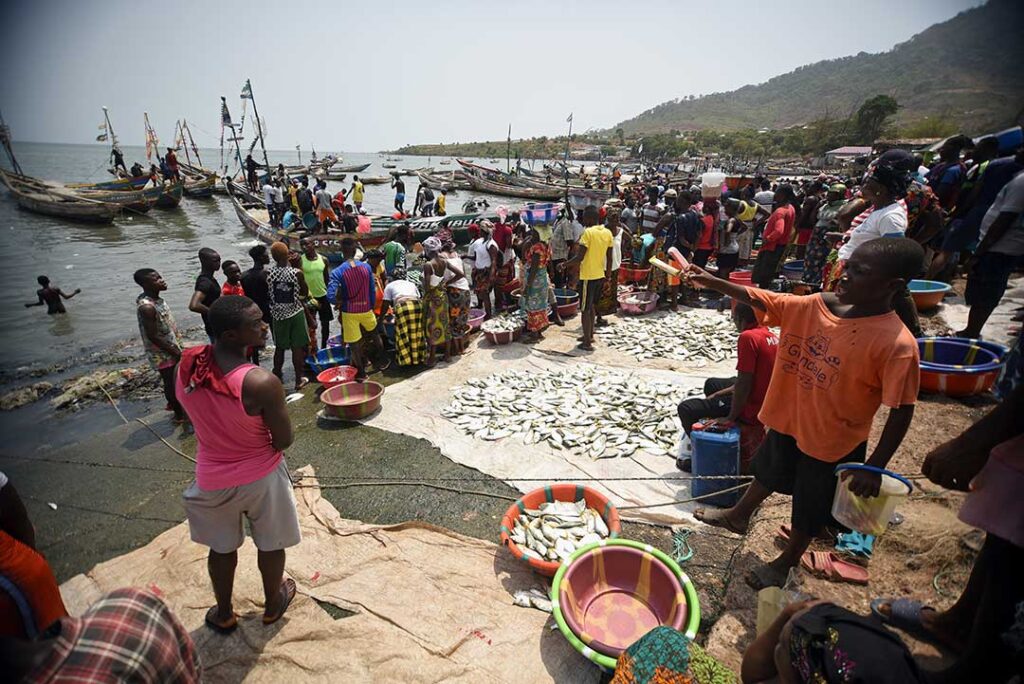ADF STAFF
For three decades, foreign vessels have targeted Sierra Leone’s waters for sardines, shrimp, bonga shad and grouper, much of which is sold overseas.
The activity of industrial trawlers puts the livelihoods of 500,000 Sierra Leonean fisheries workers in jeopardy, as fish stocks plummeted rapidly between 2009 and 2021, according to a report by The European Times. The declining fish stocks drive food insecurity because locally caught fish accounts for 80% of the nation’s protein consumption.
Some vessels are permitted to fish there, but observers say that revenue from taxes and licensing fees from foreign fishing companies are negligible. The nation’s limited patrol capacity also makes it difficult to enforce maritime laws along its 506-kilometer coastline, so the country does not collect much money from fines related to illegal, unreported and unregulated (IUU) fishing.
Sierra Leone has the potential to earn more than $50 million a year from its fisheries, but typically collects less than $18 million due to IUU fishing, according to the report.
“We in the community are suffering,” Zainab Nijae, a fish seller in Freetown told Greenpeace Africa. “We can no longer feed and educate our children because of poor fishing.”
Nijae made those comments five years ago, and local fisheries workers say little has changed since.
Sierra Leonean President Julius Maada Bio pledged to tackle IUU fishing after taking office in 2018.
The government partnered with nongovernmental organization Sea Shepherd Global in 2020, a deal that has helped the country arrest several vessels involved in IUU fishing, mostly Chinese.
Sierra Leone’s government also is battling tax evasion in its efforts to eliminate illegal fishing. The government says it will close businesses, take court action or withhold port clearance certificates from companies that don’t pay taxes.
Sierra Leone has invested in six boats to patrol coastal inshore waters and in radio equipment, electronic tablets and Android phones to strengthen maritime law enforcement and surveillance, Bio said in a Sierra Leone Telegraph report.
In 2019, Sierra Leone implemented a one-month ban on industrial fishing that was meant to help replenish fish stocks, but local fishermen and conservationists said more needs to be done.
“It is an effort that we must encourage; however, it is not enough,” Ibrahim Cisse, senior oceans manager for Greenpeace Africa, told Nigerian news network Channels Television. “We know that the measures that underpin a biological resting period go way beyond a simple one-month halt of activities. These measures need to be based on a biological rest on the migration of the species.”
The Global Initiative Against Transnational Organized crime has published a yearly IUU Fishing Index since 2019. Among other things, the index ranks countries’ improvements in the fight against illegal fishing. Sierra Leone, Cameroon and Sudan were among the nations whose counter-IUU efforts improved between 2019 and 2021.
However, in 2021 when Sierra Leone announced a plan to build a $55 million industrial fishing harbor on 100 hectares of beach and protected rainforests, fishermen and conservationists objected.
The Chinese-backed project at Black Johnson Beach includes a fish processing plant in a tourist area 35 kilometers south of Freetown, the capital. It borders virgin rainforest that is home to chimpanzees and protected bird species. It also borders Western Area Peninsula National Park, where endangered species such as duiker antelope and pangolins live.
A nearby lagoon is a breeding ground for fish and turtles and opens up into a river during the rainy season, while the waters of Whale Bay brim with sardinella, sardines, barracuda and grouper.
An opinion piece in the Sierra Leone Telegraph predicted that the project will threaten national food security, destroy pristine fish-breeding sites and devastate the livelihoods of artisanal fishermen.

